Journals
BULAG
Editor: Sylviane Cardey
Created in 1980, the BuLAG book series, Bulletin de Linguistique Appliquée et Générale (Bulletin of Applied and General Linguistics) publishes original theoretical or applied articles in general linguistics and natural language processing. It is an internationalpeer-reviewed journal and each year a theme is proposed and a call is posted on various mailing lists. Articles in English or French are selected by an international committee.
Cahiers du théâtre antique
Editors: Michel Fartzoff and Marie-Pierre Noël
Published by the Groupe Interdisciplinaire du Théâtre Antique and Université Paul-Valéry (Montpellier), the Cahiers du GITA (CGita) were founded by Paulette Ghiron-Bistagne and subsequently edited by Alain Moreau, Pierre Sauzeau, and Marie-Pierre Noël. The opening issue, entitled Melpomène 84: mélanges interdisciplinaires sur la tragédie grecque, came out in 1985. Several supplements and 18 numbers on a single theme came out from 1985 until 2011.
Now published by the Presses universitaires de Franche-Comté and edited jointly by Michel Fartzoff and Marie-Pierre Noël, within the framework of a cooperation between research centers ISTA (Institut des Sciences et Techniques de l’Antiquité – EA 4011) in Besançon and CRISES (Centre de Recherches Interdisciplinaires en Sciences Humaines et Sociales – EA 4424) in Montpellier, CTA (a.k.a. CGita) is currently the only French journal devoted to ancient classical theater and its reception.
Each issue is devoted to a central theme (study of a play or theatrical), and rooted primarily in Greek and Roman theater, though regularly incorporating a comparative literature approach, both synchronically and diachronically: thus, ancient classical theater is envisaged within both its original performance context and its interpretive, performance, and constant adaptation history, from antiquity to the present day. The journal is therefore intended for a wide readership: all specialists of Greek and Roman antiquity and its reception, and also everyone interested in Western theatrical history, forms, and practice.
Coulisses*
See Skén&graphie.
Dialogue d'Histoire Ancienne
Editor: Antonio Gonzales
Dialogues d’Histoire Ancienne (DHA) is a multilingual international semiannual journal (with a three-tiered editorial board) devoted to ancient history and classical studies. Since its founding by Pierre Lévêque in 1974, it has been a site for discussion and debate for specialists of antiquity with the most diverse scholarly backgrounds. Since 2005, it has issued two or three yearly supplements It is sponsored by the Institut des Sciences Humaines et Sociales of the CNRS and published and distributed by the Presses universitaires de Franche-Comté. It features scholarly articles, summaries of events, book reviews, and brief notes. It includes a table of contents, abstracts, and keywords. Articles are submitted to the editorial committee for approval before going through peer-review (two outside experts, a third one if arbitration is needed) in blind copy, in keeping with procedures agreed upon by the editorial committee.
HiMA : revue internationale d'histoire militaire ancienne
Editor: Giusto Traina
The Revue internationale d’Histoire Militaire Ancienne (HiMA) aims at providing everyone interested in ancient military history – teachers, scholars, academics, students, and a wider cultivated audience – with the opportunity to follow the most recent research in the field of military history, war, and societies in the ancient world. Its primary focus is the Mediterranean World in its entirety (Near-East, Egypt, Greece, Rome, late antiquity), but it is open to other contexts, such as China and Central Asia, especially from a comparative perspective. Its interests also encompass “ancient military thought” and its posthumous influence in the modern era.
Its hope is to deal with military history in all its aspects: not only specifically technical issues such as strategy and tactics, logistics, and armament, but also economics and the law, social and institutional history, as well as event-driven history, based on military and diplomatic activities, and still often derided as “battle history.” Indeed, war is not just the history of battles: it is deeply rooted in the structures of societies, where it stands with the rule rather than the exception, as the ancients were well aware.
An international, plurilingual journal, HiMA is published once a year and comprises articles, chronicles, and full-length and brief reviews. In addition, it regularly issues thematic supplements.
Hera's Peacock
Editor: Laurence Le Diagon
Hera’s Peacock is an international thematic interdisciplinary journal.
What’s in a name?
In Greek mythology Hera sent Argus, the giant with a hundred eyes, to watch over her unfaithful husband Zeus, who was enamoured of Io. To recover his freedom of action, the king of the gods commanded Hermes to slay the giant. Thwarted, Hera transferred Argus’s eyes to the peacock, her favourite animal. This hundred-eyed peacock captures the ambition of the journal—to convey multiple points of view of one subject.
Philosophique
Editor: Louis Ucciani
Journal published by the Center of Philosophical documentation and bibliography and by the University of Franche-Comté’s Philosophical Research Laboratory on the logic of action.
Publications mathématiques de Besançon
Editor: Christophe Delaunay
Created in 1974 by Georges Gras, The Mathematic Publications of Besançon – Algebra and Number Theory edit not only research articles, but also synthetic articles, articles des actes, and advanced course articles. The journal is reviewed by Zentralblatt and Mathematical Reviews.
Semen
Editor: Andrée Chauvin-Vileno
Founders: Th. Aron, J. Peytard (1983). Semen (Collection from the Annales Littéraires) is a language sciences journal: it mainly deals with speech analysis, textual linguistics, and semiotics. Links with other disciplines: psychoanalysis, philosophy, sociology.
SKÉN&GRAPHIE
Editors: Julia Peslier and Pascal Lécroart
Skén&graphie, successor journal of Coulisses, a pluridisciplinary and compartive study of writings for and about the stage in three domains: the « Critical Journal » unfolds thematic lines; the «Cahier de la création» deals with beautifying unedited dramatic texts; the “Cahier des Spectacles det des Professionnels” summarizes life in the current scene.
-
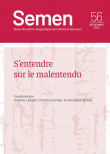
Semen 56
Frédéric LAMBERT – Christine SERVAIS – Véronique SERVAIS (edit. coord.) – 2024
This dossier considers misunderstanding as a critical concept that questions our freedoms in situations of communication and sensitive listening. The articles address media, scientific, cultural and political contexts.
 18.50 €
18.50 € -
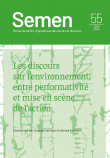
Semen 55
Andrea CATELLANI – Amaia ERRECART (edit. coord.) – 2024
This dossier examines the relationship between discourse and action in favour of the environment. Its aim is to is to examine the performativity of environmental discourse from the dual discursive and semiotic analysis.
 18.50 €
18.50 € -
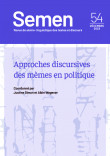
Semen 54
Justine SIMON – Albin WAGENER (edit. coord.) – 2023
Memes have gained considerable importance within socio-digital spaces, transitioning from a mere playful pastime to a true technodiscourse capable of embodying persuasive strategies. This review dossier addresses the role of memes in political communication, adopting an international and interdisciplinary perspective. A discursive sensitivity serves as the guiding thread throughout the analyses.
 18.50 €
18.50 € -
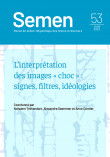
Semen 53
Nolwenn TRÉHONDART – Alexandra SAEMMER – Anne CORDIER (edit. coord.) – 2023
The articles in this issue of Semen focus on the way in which polemics and interpretative debates are created, developed and organised in different media outlets, in connection with the production, dissemination and reception of 'shock' images.
 18.50 €
18.50 € -
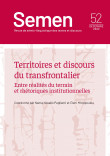
Semen 52
Nanta NOVELLO PAGLIANTI – Eleni MITROPOULOU (edit. director) – 2022
This issue of the journal Semen invites us to consider the cross-border in all its semiotic complexity and convenes it as an object studied through its discursive forms, its practices and its communicational perspectives.
 18.50 €
18.50 € -
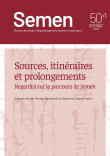
Semen 50/1
Marion Bendinelli – Séverine Equoy-Hutin (edit. coord.) – 2022
This 50th issue of the journal Semen is atypical: in this first volume (50/1), the authors offer a complementary recount of the thematic, disciplinary and epistemological path of the journal founded in 1983 by Jean Peytard and Thomas Aron..
 18.50 €
18.50 € -
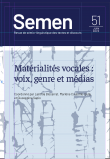
Semen 51
Laëtitia BISCARRAT – Marlène COULOMB-GULLY – Giuseppina SAPIO (edit. coord.) – 2022
This issue from the journal Semen deals with the links between gender and voice in contemporaneous media practices. It interrogates how gender is incorporated and reveals itself through vocal phenomenon.
 18.50 €
18.50 € -
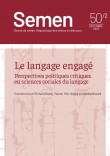
Semen 50/2
Richard GUEDJ – Manon HIM-AQUILLI – Sandra NOSSIK (edit. coord.) – 2022
This anniversary issue of Semen questions the production of critical knowledge in the social sciences of language, and offers, in articles and interviews, political, analytical and epistemological research perspectives.
 18.50 €
18.50 € -
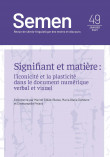
Semen 49
Marion Colas-Blaise – Maria Giulia Dondero – Emmanuelle Pelard (edit. coord.) – 2021
Studies on the material, iconic and plastic aspects of the digital document and on the technological devices.
 18.50 €
18.50 € -
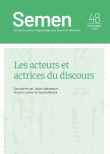
Semen 48
Julien AUBOUSSIER – Virginie LETHIER – Sandra NOSSIK (edit. coord.) – 2020
The contributions of this special issue investigate the notion of social actor through the lens of discourse analysis, communication sciences and social sciences, from different corpora (media discourse, narrative interviews, interactions…).
 18.50 €
18.50 €








